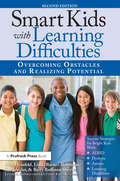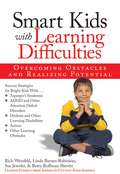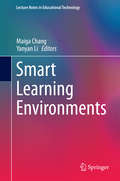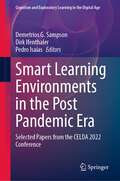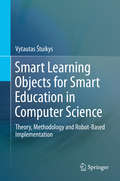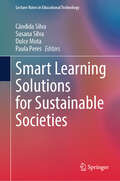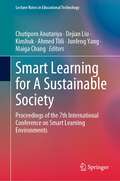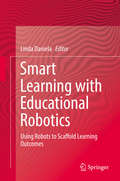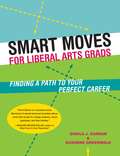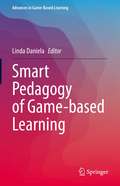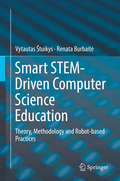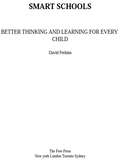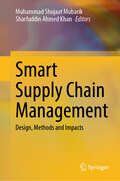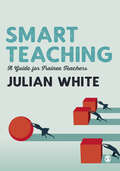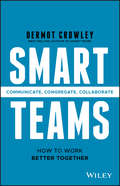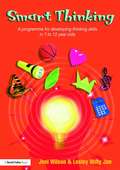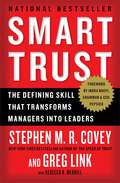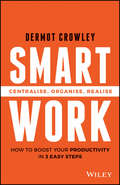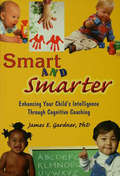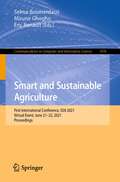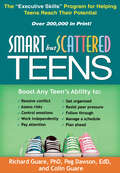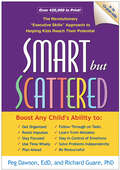- Table View
- List View
Smart Kids With Learning Difficulties: Overcoming Obstacles and Realizing Potential
by Rich Weinfeld Linda Barnes-Robinson Sue Jeweler Betty Roffman ShevitzThe second edition of Smart Kids With Learning Difficulties is an updated and comprehensive must-read for parents, teachers, counselors, and other support professionals of bright kids who face learning challenges every day. This practical book discusses who these students are; how to identify them; what needs to be implemented; best practices, programs, and services; and specific actions to ensure student success. Along with tools and tips, each chapter includes Key Points, a new feature that will help focus and facilitate next steps and desired outcomes and follow-up for parents and teachers. The new edition includes a look at current definitions of twice-exceptional students, updated research findings and identification methods, a detailed description of the laws and policies impacting this population, what works and what doesn't work, model schools, Response to Intervention, Understanding by Design, comprehensive assessments, social-emotional principles, and new assistive technology. Featured in The Fresno Bee
Smart Kids with Learning Difficulties: Overcoming Obstacles and Realizing Potential
by Rich Weinfeld Linda Barnes-Robinson Sue Jeweler Betty Roffman ShevitzSmart Kids With Learning Difficulties: Overcoming Obstacles and Realizing Potential is an engaging must-read for any parent, educator, or counselor of smart kids who face learning difficulties. The authors provide useful, practical advice for helping smart kids with learning challenges succeed in school. Topics covered in the book include: identifying and recognizing gifted/learning disabled students, what the law says about this population, planning and developing accommodations that empower these students, what works and doesn't work in the classroom, tools and checklists to build supportive learning environments, and the roles and responsibilities of parents, students, and school personnel. Book jacket.
Smart Kids with School Problems: Things to Know and Ways to Help
by Priscilla L. VailPriscilla Vail has created an authoritative guide to spot conundrum kids, evaluating their problems, and using the right do and don't strategies for dealing with them in the school environment and at home.
Smart Learning Environments
by Yanyan Li Maiga ChangThis book addresses main issues concerned with the future learning, learning and academic analytics, virtual world and smart user interface, and mobile learning. This book gathers the newest research results of smart learning environments from the aspects of learning, pedagogies, and technologies in learning. It examines the advances in technology development and changes in the field of education that has been affecting and reshaping the learning environment. Then, it proposes that under the changed technological situations, smart learning systems, no matter what platforms (i. e. , personal computers, smart phones, and tablets) they are running at, should be aware of the preferences and needs that their users (i. e. , the learners and teachers) have, be capable of providing their users with the most appropriate services, helps to enhance the users' learning experiences, and to make the learning efficient.
Smart Learning Environments in the Post Pandemic Era: Selected Papers from the CELDA 2022 Conference (Cognition and Exploratory Learning in the Digital Age)
by Dirk Ifenthaler Demetrios G. Sampson Pedro IsaíasThis edited volume presents the latest research focussing on current challenges on the deployment of smart technologies and pedagogies for supporting teaching and learning in the post-covid19 era. This is at the core of studying the evolution of the learning process, the role of technology-supported pedagogical approaches, and the progress of educational technology innovations in the context of digital transformation in education and professional training. A selection of the best papers from the Cognition and Exploratory Learning in the Digital Age (CELDA) Conference, 2022 are included in this volume, bringing together high-quality research on Smart Pedagogies in the Post-Pandemic Era; Smart Learning Technologies in the Post-Pandemic Era; and Case Studies of Smart Learning Environments. The volume contributes to the discussion of current issues in digital education between researchers, practitioners, and policymakers.
Smart Learning Objects for Smart Education in Computer Science
by Vytautas ŠtuikysThis monograph presents the challenges, vision and context to design smart learning objects (SLOs) through Computer Science (CS) education modelling and feature model transformations. It presents the latest research on the meta-programming-based generative learning objects (the latter with advanced features are treated as SLOs) and the use of educational robots in teaching CS topics. The introduced methodology includes the overall processes to develop SLO and smart educational environment (SEE) and integrates both into the real education setting to provide teaching in CS using constructivist and project-based approaches along with evaluation of pedagogic outcomes. Smart Learning Objects for Smart Education in Computer Science will appeal to researchers in CS education particularly those interested in using robots in teaching, course designers and educational software and tools developers. With research and exercise questions at the end of each chapter students studying CS related courses will find this work informative and valuable too.
Smart Learning Solutions for Sustainable Societies (Lecture Notes in Educational Technology)
by Cândida Silva Susana Silva Dulce Mota Paula PeresThis book showcases research and project results on technology, smart learning, and sustainability education and analyzes smart learning solutions for lifelong learning. It discusses their impact and potential for transfer and scaling and reviews how real solutions perform in the real world. Sustainable societies are built on twenty-first-century skills. Attaining the United Nations' Sustainable Development Goals requires a focus on a new set of knowledge, skills, and attitudes, as well as novel and smart strategies that leverage state-of-the-art technologies and make these skillsets widely available in our societies to all groups of people, at any time in their lives, in professional as well as academic settings. This book serves as a helpful resource for researchers, academics, practitioners, and consultants from around the world who are involved in the study, management and development of educational technology, smart learning, sustainability education, and related issues.
Smart Learning for A Sustainable Society: Proceedings of the 7th International Conference on Smart Learning Environments (Lecture Notes in Educational Technology)
by Kinshuk Maiga Chang Junfeng Yang Dejian Liu Ahmed Tlili Chutiporn AnutariyaThis book collects the proceedings of the 7th International Conference on Smart Learning Environments (ICSLE2023), held in Bangkok, Thailand, as a hybrid conference from 31st Aug to 1st Sep 2023. The proceedings focus on the interplay between pedagogy and technology, and their fusion towards the advancement of smart learning for a sustainable society. This book covers topics such as: artificial intelligence (AI) and smart technologies in education, innovative applications of smart learning, pedagogy, learning approaches and instructional design, online and digital learning spaces, and lessons learned from the COVID-19 pandemic. It serves as a useful reference for stakeholders in the field of education who are interested in emerging technologies and their applications in smart learning, such as researchers, postgraduate students, undergraduate students, as well as policy makers.
Smart Learning with Educational Robotics: Using Robots to Scaffold Learning Outcomes
by Linda DanielaThis book will offer ideas on how robots can be used as teachers' assistants to scaffold learning outcomes, where the robot is a learning agent in self-directed learning who can contribute to the development of key competences for today's world through targeted learning - such as engineering thinking, math, physics, computational thinking, etc. starting from pre-school and continuing to a higher education level. Robotization is speeding up at the moment in a variety of dimensions, both through the automation of work, by performing intellectual duties, and by providing support for people in everyday situations. There is increasing political attention, especially in Europe, on educational systems not being able to keep up with such emerging technologies, and efforts to rectify this. This edited volume responds to this attention, and seeks to explore which pedagogical and educational concepts should be included in the learning process so that the use of robots is meaningful from the point of view of knowledge construction, and so that it is safe from the technological and cybersecurity perspective.
Smart Moves for Liberal Arts Grads: Finding a Path to Your Perfect Career
by Sheila Curran Suzanne GreenwaldMost people would love to have 20/20 hindsight on their careers. In Smart Moves for Liberal Arts Grads, college career experts Sheila Curran and Suzanne Greenwald have assembled the next best thing: the collective wisdom of a diverse and inspiring cast of success stories--twenty-three liberal arts graduates who have gone on to all manner of fascinating and satisfying professions. The authors have combined lessons from the stories with their own hands-on experience with thousands of students and graduates to outline a framework for finding a perfect career. What makes Smart Moves different is that it provides essential career advice while being fun to read. Readers will be struck by the frankness of the biographies of real graduates whose careers have taken twists and turns. Todd turned his passion into a living as the founder and CEO of several small businesses and a professional cellist; Thad's path took him from English major to a dream job in the front office of a major league baseball team; and a subway ride helped Sharon speed her intended career leap from a luxury department store to journalism. What binds them together is that they have all made smart moves on the way to career success--both during their liberal arts education and in the real world.Smart Moves not only champions the value of a liberal arts education, it also embraces the complexity of careers, and the notion that many different factors contribute to success: education, experience, attitude, personal characteristics, and a good dose of luck. Smart Moves is an inspiration to all those who are seeking proven strategies to follow their passion--no matter what their age.The quarter million liberal arts students who receive diplomas each year will truly benefit from the insights of Smart Moves. But this book is equally helpful for high school students (and their guidance counselors) looking at colleges, for graduates still looking for their life's work, and for parents who want to understand career realities for their children. An innovative career guide for our stressful, fast-paced world, Smart Moves for Liberal Arts Grads illuminates valuable career lessons with sharp advice and an unparalleled framework for success.From the Trade Paperback edition.
Smart Pedagogy of Game-based Learning (Advances in Game-Based Learning)
by Linda DanielaThis book addresses the role of appropriate, specialized, structured pedagogy for game-based learning. It is an important reference for researchers who have carried out studies in the field of game-based learning with a focus on the digital learning environment. The educational landscape has dramatically changed in times of global pandemic urging us to search for new solutions, new educational pathways, and new agents for knowledge development. There is a need to support learning by using digital learning materials during remote learning or distance learning, where pedagogically structured game-based learning elements can play a role in motivating students to achieve.Utilizing game-based learning in education is not new, but this book adds substantially to the research base of the topic. The book reveals many new concepts, such as, balancing games and learning, supporting knowledge development, supporting the development of motivation, supporting balanced cognitive load in an effort to avoid ineffective forms of game-based learning
Smart STEM-Driven Computer Science Education: Theory, Methodology and Robot-based Practices
by Vytautas Štuikys Renata BurbaitėAt the centre of the methodology used in this book is STEM learning variability space that includes STEM pedagogical variability, learners’ social variability, technological variability, CS content variability and interaction variability. To design smart components, firstly, the STEM learning variability space is defined for each component separately, and then model-driven approaches are applied. The theoretical basis includes feature-based modelling and model transformations at the top specification level and heterogeneous meta-programming techniques at the implementation level.Practice includes multiple case studies oriented for solving the task prototypes, taken from the real world, by educational robots. These case studies illustrate the process of gaining interdisciplinary knowledge pieces identified as S-knowledge, T-knowledge, E-knowledge, M-knowledge or integrated STEM knowledge and evaluate smart components from the pedagogical and technological perspectives based on data gathered from one real teaching setting. Smart STEM-Driven Computer Science Education: Theory, Methodology and Robot-based Practices outlines the overall capabilities of the proposed approach and also points out the drawbacks from the viewpoint of different actors, i.e. researchers, designers, teachers and learners.
Smart Schools: From Training Memories to Educating Minds
by David PerkinsPrekins' research indicates that students from the first grade through college often have only the most superficial kind of knowledge even after considerable instruction in a subject. Here he reveals some commonly misguided strategies students use in trying to understand a topic, and why traditional-teaching approaches often fail.
Smart Supply Chain Management: Design, Methods and Impacts
by Muhammad Shujaat Mubarik Sharfuddin Ahmed KhanThis book unravels the multifaceted role of smart supply chain. Taking a holistic approach, it explains how smart supply chain could contribute to the apex supply chain performance parameters like supply chain resilience, sustainability, and visibility. It explains the application of smart supply chain, particularly supply chain digital twin, in mapping the end-to-end supply chains. The book also discusses linkage of smart supply chain with supply chain ambidexterity, a topic not much explored. Further, there is discussion on usage of smart supply chain to employ latest developments like physical Internet, for transportation optimization and so on. It will also explore the role of human factor, relationships and business processes, operationalized as intellectual capital. The book is of interest to supply chain managers, researchers, and academicians looking to understand diverse aspects of smart supply chain. Business leaders who have their eyes on future business managers, and managers who want to be conversant with cutting edge knowledge on the topic, would also find many takeaways in this volume.
Smart Teaching: A Guide for Trainee Teachers
by Julian WhiteWhether you are training to teach in primary or secondary schools, or stepping into the classroom as a qualified teacher, this book is your smart guide to informed classroom practice. It offers guidance on developing essential teaching skills, drawn from robust research findings and real-life examples, with reference to the Core Content Framework throughout. Each chapter offers strategies for success that are quickly applicable and can save time as you enhance and improve your teaching practice. Key topics include: · Establishing positive behaviour in your classroom · Structuring effective lessons for rapid learning · Adapting your teaching to meet individual needs · Using assessment to fine tune your teaching and enhance the learning · What to expect after your teacher training Julian White is Programme lead for the PGCE Secondary in Secondary English at Bradford College.
Smart Teaching: A Guide for Trainee Teachers
by Julian WhiteWhether you are training to teach in primary or secondary schools, or stepping into the classroom as a qualified teacher, this book is your smart guide to informed classroom practice. It offers guidance on developing essential teaching skills, drawn from robust research findings and real-life examples, with reference to the Core Content Framework throughout. Each chapter offers strategies for success that are quickly applicable and can save time as you enhance and improve your teaching practice. Key topics include: · Establishing positive behaviour in your classroom · Structuring effective lessons for rapid learning · Adapting your teaching to meet individual needs · Using assessment to fine tune your teaching and enhance the learning · What to expect after your teacher training Julian White is Programme lead for the PGCE Secondary in Secondary English at Bradford College.
Smart Teams: How to Work Better Together
by Dermot CrowleyCommunicate, congregate and collaborate more effectively than ever Smart Teams will help your team to go beyond personal productivity to enhance team productivity. Building on the concepts presented in Smart Work, which focuses on personal productivity, this book shows you how to turn unproductive team behaviours that create friction into ‘superproductive’ behaviours that promote flow. Productivity is, at its core, a leadership issue — and this book provides practical guidelines that help you build a culture where productivity thrives. Working together can be a drag — literally. Email noise, unproductive meetings and poorly organised projects can stifle creativity and disrupt everyone’s workflow. But by creating team agreements that raise awareness of the negative impact of our behaviours, you build the desire and capability to change. This book is packed with tips, guidelines and expert insights for leaders and managers at any level. Foster a culture of ‘superproductivity’ Create a set of Smart Team principles to guide cooperation Run fewer, shorter and more effective meetings Collaborate more productively on projects Reduce urgency, interruptions and email noise People want their work to matter, they want to make an impact and they want to do it all with a healthy work-life balance — productivity is the key to making it all happen. Smart Teams shows you how to implement the culture shift that will allow your team to flourish.
Smart Thinking: A Programme for Developing Thinking Skills in 7 to 12 Year Olds
by Jeni Wilson Lesley Wing JanSmart Thinking helps primary school teachers to develop their pupil's capacities to become deep thinkers and independent learners. Supporting the creation of a thoughtful classroom that provides opportunities for pupil's negotiation, goal setting and decision making, this book encourages the teaching of reflection and metacognition, providing pupils the tools they need to be able to evaluate and regulate their own thinking. Packed with ideas, planning tools and photocopiable proformas, this book will help teachers work with their pupils to help develop skills and dispositions which are beneficial and transferable to pupils of all ages and abilities. Key aspects of teaching and learning covered include: planning for learning by setting individual goals selecting, using and monitoring appropriate strategies identifying own thinking processes making reasoned judgements asking powerful questions being careful observers. This comprehensive resource is essential for all teachers who wish to empower their pupils to take responsibility for their learning and their interpersonal relationships.
Smart Trust: Creating Prosperity, Energy, and Joy in a Low-Trust World
by Rebecca R. Merrill Stephen M.R. Covey Greg LinkAfter illustrating the global relevance of trust with his book The Speed of Trust by selling more than one million copies in twenty-two languages, Stephen M.R. Covey again illuminates the hidden power of trust to change lives and impact organizations in Smart Trust. In a compelling and readable style, he and long-time business partner Greg Link share enlightening principles and anecdotes of people and organizations that are not only achieving unprecedented prosperity from high-trust relationships and cultures but--even more inspiring--also attaining elevated levels of energy and joy. Find out why trusted people are more likely to get hired or promoted, get the best projects and bigger budgets, and are last to be laid off. This sea-changing book will forever shift your perspective as it reveals and validates, once and for all, the transformational power of trust. Reading Smart Trust will increase your probability of thriving in this increasingly unpredictable marketplace. The more unpredictable it becomes, the more your (and your organization's) sound judgment and ability to trust in this low-trust world will give you a tremendous competitive advantage--and the capacity to navigate the uncertainty low trust creates.
Smart Trust: Creating Prosperity, Energy, and Joy in a Low-trust World
by Rebecca R. Merrill Stephen M. R. Covey Greg Link"Smart Trust is without doubt one of the most powerful and seminal books of our age" (Warren Bennis).After illustrating the global relevance of trust with his book The Speed of Trust by selling more than one million copies in twenty-two languages, Stephen M. R. Covey again illuminates the hidden power of trust to change lives and impact organizations in Smart Trust. In a compelling and readable style, he and long-time business partner Greg Link share enlightening principles and anecdotes of people and organizations that are not only achieving unprecedented prosperity from high-trust relationships and cultures but--even more inspiring--also attaining elevated levels of energy and joy. The sustainable success these leaders and enterprises are exhibiting is paradoxically being produced in what has proved to be the lowest trust climate in years, if not decades. Smart Trust shows what they are doing and the five actions they are commonly taking to prosper, against the odds, in the same circumstances causing so many others to fail. With penetrating insights illuminated by their unique access to many of the world's most successful leaders and organizations, the authors lay out a breakthrough process and skill set in a practical and actionable formula that makes trust a performance multiplier for leaders, teams, organizations, and even countries. They show why trust is fast becoming the most consequential life and leadership skill of our time--a career-critical competency required to navigate and compete in this perilous twenty-first-century interdependent, global economy. Covey and Link teach how to cut through traditional either/or thinking to extend "Smart Trust," enabling you to exercise sound judgment in a low-trust world by minimizing risk and maximizing possibilities. Smart Trust has met the strict scrutiny of business leaders around the globe and is validated by research from multiple sources that confirms that high-trust organizations outperform low-trust organizations by nearly three times. Smart Trust shares findings that verify how enduring success, vitality, and happiness are directly related to the level of trust in our relationships--whether in our professional or personal lives. Find out why trusted people are more likely to get hired or promoted, get the best projects and bigger budgets, and are last to be laid off. This sea-changing book will forever shift your perspective as it reveals and validates, once and for all, the transformational power of trust. Reading Smart Trust will increase your probability of thriving in this increasingly unpredictable marketplace. The more unpredictable it becomes, the more your (and your organization's) sound judgment and ability to trust in this low-trust world will give you a tremendous competitive advantage--and the capacity to navigate the uncertainty low trust creates.
Smart Work
by Dermot CrowleyOrganise your way to renewed focus and calm Smart Work is the busy professional's guide to getting organised in the digital workplace. Are you drowning in constant emails, phone calls, paperwork, interruptions and meeting actions? This book throws you a lifeline by showing you how to take advantage of your digital tools to reprioritise, refocus and get back to doing the important work. You may already have the latest technology, but if you're still swamped, you're not using it to your advantage. This useful guide shows you how to leverage the technology you have to centralise your work into one integrated tool. You'll develop a simple and sustainable productivity system to organise your actions, manage your inputs and achieve your outcomes. The highly visual nature of the book helps you quickly grasp the ideas you need most. Like most professionals, you want to do great work and achieve great things. But when half your day is spent on emails, phone calls and 'extra' duties, you rarely get a chance to shine. This book changes that. Get back in control so you can start performing like a star. Get organised, focused and proactive Conquer the daily incoming deluge Spend more time on important work Leverage your desktop and mobile technology When work is coming at you from every direction, it's difficult to focus and prioritise. Things get lost in the shuffle. But when you channel everything into a single stream, you settle into a flow and get more accomplished in less time. Smart Work is your guide to finding your flow-- and the bottom of your inbox.
Smart and Smarter: Enhancing Your Child's Intelligence Through Cognitive Coaching
by Gardner"First Published in 1999, Routledge is an imprint of Taylor & Francis, an informa company."
Smart and Sustainable Agriculture: First International Conference, SSA 2021, Virtual Event, June 21-22, 2021, Proceedings (Communications in Computer and Information Science #1470)
by Selma Boumerdassi Éric Renault Mounir GhoghoThis book constitutes the refereed proceedings of the First International Conference on Smart and Sustainable Agriculture, SSA 2021, held as a virtual event in June 2021. The 12 papers presented were thoroughly reviewed and selected from the 25 qualified submissions. The papers provide discussion on new trends in communication and networking, Internet of Things, data processing for smart agriculture, renewable-energy based devices, low-cost solutions for wide-area exploitations and developing countries, smart agriculture and urban farming, smart irrigation, application to small-size andlarge-size exploitations, application of ancestral farming to smart agriculture, waste management for agriculture 2.0, and census of regional ancestral farming.
Smart but Scattered Teens: The "Executive Skills" Program for Helping Teens Reach Their Potential
by Peg Dawson Richard Guare Colin Guare"I told you, I'll do it later." "I forgot to turn in the stupid application." "Could you drive me to school? I missed the bus again." "I can't walk the dog--I have too much homework!"If you're the parent of a "smart but scattered" teen, trying to help him or her grow into a self-sufficient, responsible adult may feel like a never-ending battle. Now you have an alternative to micromanaging, cajoling, or ineffective punishments. This positive guide provides a science-based program for promoting teens' independence by building their executive skills--the fundamental brain-based abilities needed to get organized, stay focused, and control impulses and emotions. Executive skills experts Drs. Richard Guare and Peg Dawson are joined by Colin Guare, a young adult who has successfully faced these issues himself. Learn step-by-step strategies to help your teen live up to his or her potential now and in the future--while making your relationship stronger. Helpful worksheets and forms can be downloaded and printed in a convenient 8 1/2" x 11" size. See also the authors' Smart but Scattered (with a focus on 4- to 13-year-olds) and their self-help guide for adults. Plus, Work-Smart Academic Planner: Write It Down, Get It Done, designed for middle and high school students to use in conjunction with coaching, and related titles for professionals. Winner (Third Place)--American Journal of Nursing Book of the Year Award, Consumer Health Category
Smart but Scattered: The Revolutionary "Executive Skills" Approach to Helping Kids Reach Their Potential
by Peg Dawson Richard GuareThere's nothing more frustrating than watching your bright, talented son or daughter struggle with everyday tasks like finishing homework, putting away toys, or following instructions at school. Your "smart but scattered" child might also have trouble coping with disappointment or managing anger. Drs. Peg Dawson and Richard Guare have great news there's a lot you can do to help. The latest research in child development shows that many kids who have the brain and heart to succeed lack or lag behind in crucial "executive skills"--the fundamental habits of mind required for getting organized, staying focused, and controlling impulses and emotions. Learn easy-to-follow steps to identify your child's strengths and weaknesses, use activities and techniques proven to boost specific skills, and problem-solve daily routines. Small changes can add up to big improvements--this empowering book shows how.
